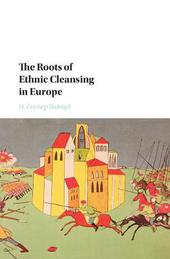
|
The Roots of Ethnic Cleansing in Europe
Hardback
Main Details
| Title |
The Roots of Ethnic Cleansing in Europe
|
| Authors and Contributors |
By (author) H. Zeynep Bulutgil
|
| Series | Problems of International Politics |
|---|
| Physical Properties |
| Format:Hardback | | Pages:234 | | Dimensions(mm): Height 235,Width 158 |
|
| Category/Genre | Genocide and ethnic cleansing |
|---|
| ISBN/Barcode |
9781107135864
|
| Classifications | Dewey:304.663094 |
|---|
| Audience | | Professional & Vocational | |
|---|
| Illustrations |
12 Tables, black and white; 8 Line drawings, black and white
|
|
Publishing Details |
| Publisher |
Cambridge University Press
|
| Imprint |
Cambridge University Press
|
| Publication Date |
15 September 2016 |
| Publication Country |
United Kingdom
|
Description
Using a new approach to ethnicity that underscores its relative territoriality, H. Zeynep Bulutgil brings together previously separate arguments that focus on domestic and international factors to offer a coherent theory of what causes ethnic cleansing. The author argues that domestic obstacles based on non-ethnic cleavages usually prevent ethnic cleansing whereas territorial conflict triggers this policy by undermining such obstacles. The empirical analysis combines statistical evaluation based on original data with comprehensive studies of historical cases in Central and Eastern Europe, as well as Bosnia, in the 1990s. The findings demonstrate how socio-economic cleavages curb radical factions within dominant groups whereas territorial wars strengthen these factions and pave the way for ethnic cleansing. The author further explores the theoretical and empirical extensions in the context of Africa. Its theoretical novelty and broad empirical scope make this book highly valuable to scholars of comparative and international politics alike.
Author Biography
H. Zeynep Bulutgil is an Assistant Professor of Comparative Politics at the Fletcher School, Tufts University, Massachusetts. She received her Ph.D. from the University of Chicago in 2009. Her research on ethnic cleansing has been supported by fellowships from the Belfer Center at Harvard Kennedy School, the Woodrow Wilson School at Princeton University, New Jersey, and the National Science Foundation.
Reviews'The Roots of Ethnic Cleansing in Europe is an innovative contribution to the systematic study of mass violence. Using a variety of quantitative data, case studies from multiple world regions, and original theory, the book asks and answers a big question. As one of the only dedicated social scientific studies of ethnic cleansing, this book is a landmark that will command attention from scholars for years to come.' Scott Straus, University of Wisconsin, Madison 'The Roots of Ethnic Cleansing in Europe is the most systematic scholarly effort to date to understand one of the most terrible forms of violence facing humanity. Episodes of ethnic cleansing have ravaged Europe repeatedly over the last 100 years, killing millions of people and rendering tens of millions more refugees. Drawing on in-depth historical and statistical analyses, H. Zeynep Bulutgil locates the causes of these tragedies in territorial conflicts between states and in the nature of the social and political cleavages and hierarchies within states. In so doing, she points the way to policies that might render ethnic cleansing less common in the future.' Benjamin Valentino, Dartmouth College, New Hampshire 'By dint of meticulous research and methodical analysis, H. Zeynep Bulutgil has constructed an argument that is provocative and far-reaching in its implications. Calling into question common assumptions about the relationship between historical memory and inter-communal violence, Bulutgil articulates a powerful argument to the effect that ethnic cleansing is not so much dictated by the legacy of past conflicts as it is set off by the intersection between particular patterns of ethnic geography and warfare. This is a wide-ranging and methodologically rigorous comparative study that forces its readers to reexamine some of their deepest held conceptions.' Aviel Roshwald, Georgetown University, Washington, DC 'Bulutgil's innovative study examines the causes of ethnic cleansing, and why some regions are so much more prone to ethnic cleansing than others. Her fundamental and compelling point is that 'territorial revisions' alter the balance of power among groups within annexed territories that then unleash murderous dynamics. She finds that cross-cutting cleavages serve as barriers against ethnic cleansing, while interstate ethnic conflict facilitates ethnic cleansing by increasing salience of ethnicity relative to other cleavages. This important book revisits some older theories in comparative politics and ingeniously uses them to address a critical question. In sum, The Roots of Ethnic Cleansing in Europe combines sharp theoretical insight with great empirical material.' APSA European Politics and Society Section Best Book Award Committee
|